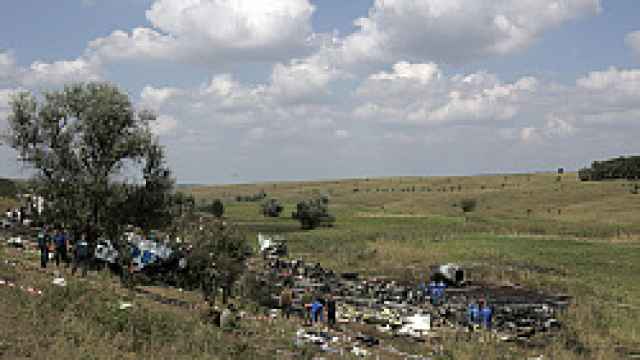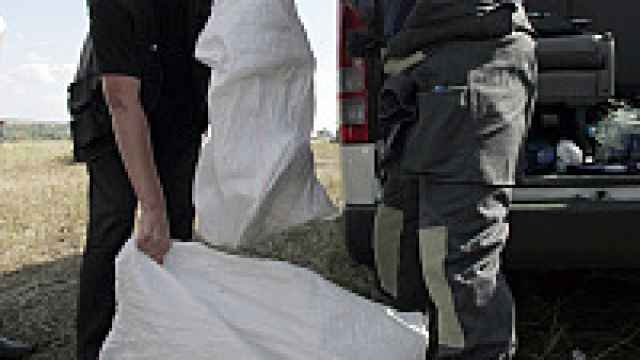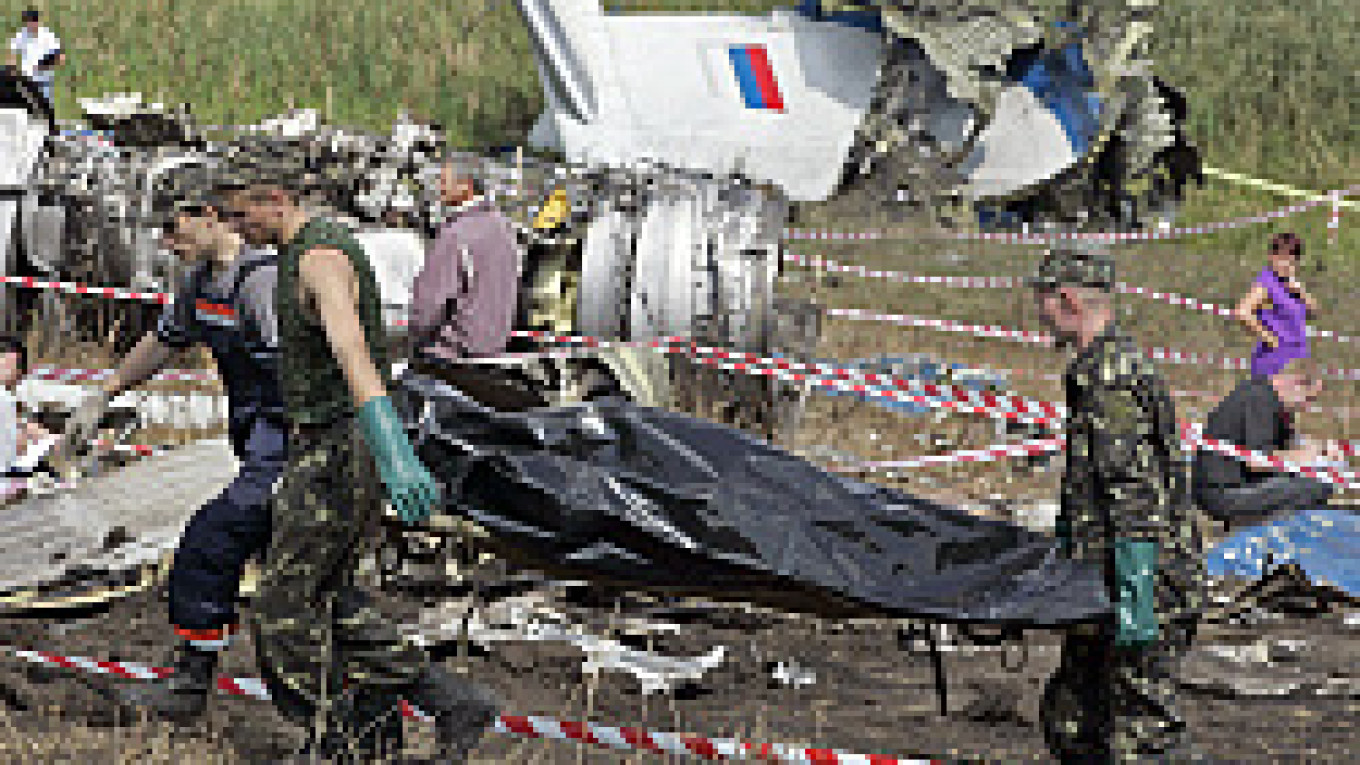Bad weather is believed to be at least partly to blame for Tuesday's crash of the 14-year-old Tu-154M.
All of the bodies have been found.
Forty-five of the victims were under 12. Six of the children were under 2; the youngest was 4 months old. Figures were provided by Vasily Naletenko, Pulkovo Airlines' deputy general director.
The death toll was revised upward by one on Wednesday. An earlier count put the figure at 169 people.
The flight was en route from the Russian Black Sea resort of Anapa to St. Petersburg when it crashed outside the village of Sukhaya Balka, near the industrial city of Donetsk.
Many of those on board were thought to be vacationers returning for the new school year, which begins Sept. 1.
The plane departed Anapa at about 3:05 p.m. It is believed to have run headlong into a storm, encountering strong winds, rain and lightning.
Sometime after 3:30 p.m., the plane issued a distress call while it was at an altitude of 11,700 meters. A second SOS signal came in soon after, when the plane had dropped to 3,000 meters.
Soon after, the plane crashed in a field between two villages. No one on the ground was hurt.
Witnesses said the plane fell to the ground like a petal, twirling in an uncontrollable tail spin, and exploded when it hit the ground.
Five foreigners were on board: two Germans and citizens from the Netherlands, France and Finland.
The two recording devices, or black boxes, will be transported to Moscow on Wednesday to be examined by Interstate Aviation Committee personnel, Transportation Minister Igor Levitin said.
Levitin, speaking at a news conference, added that it would take six weeks to decipher the information in the black boxes, which he said were in satisfactory condition.
Ukrainian President Viktor Yushchenko spoke by telephone with President Vladimir Putin on Tuesday to convey his sympathies and pledge assistance in the investigation.
Ukraine's Emergency Situations Ministry originally speculated the crew had requested an emergency landing after a fire broke out on board. Aviation experts voiced skepticism about that theory to Interfax and Moscow newspapers, saying crew members would have had time to report the fire to air traffic controllers.
Irina Andrianova, spokeswoman for the Emergency Situations Ministry, said the plane was likely struck by lightning, but that it was doubtful lightning was solely to blame for the crash.
 Ivan Sekretarev / AP Rescue workers sifting through the wreckage of Pulkovo Airlines Flight 612 near the city of Donetsk on Wednesday. | |
It is common practice for pilots to avoid turbulence caused by stormy weather by flying above the clouds.
The Interfax source said a plane crash in the Uzbek city of Uchkuduk in 1985 might have been caused by exceeding the plane's so-called ceiling. The plane in that accident was also a Tu-154; all 200 on board were killed.
Pulkovo Airlines on Wednesday arranged for family and friends to fly to the crash site. Some elderly relatives were unable to travel. Many relatives gathered at St. Petersburg's Pulkovo Airport required serious medical attention, apparently overwhelmed by news of the accident.
St. Petersburg Governor Valentina Matviyenko said the city would pay 100,000 rubles in compensation to the families of everyone on the flight, irrespective of where they lived or their citizenship.
 Ivan Sekretarev / AP Officials securing the black boxes. | |
Tuesday's tragedy comes on the heels of two other crashes in former Soviet republics.
In July, 127 of the 204 people on board a S7 Airbus A310 died when the plane crashed while landing.
In May, an Airbus A320 run by the Armenian airline Armavia crashed into the Black Sea, killing all 113 on board.
The death toll from the three crashes stands at 405.
These two accidents prompted State Duma Deputy Gennady Gudkov to call for action to boost safety standards on passenger planes.
"Regardless of whether reasons for the crash will be found, today one thing is clear: The system of safety on flights in Russia absolutely does not correspond to international standards," Gudkov said Wednesday, Interfax reported.
At the time of Tuesday's crash, the U.S. Federal Aviation Administration considered Russia to be in compliance with international safety standards.
The Tu-154M is one of the most popular planes in use by Russian airlines, Tupolev official Alexander Zatuchny said.
"There are over 400 Tu-154 aircraft currently in use, mainly the M version," he said by telephone.
"More are produced from time to time. They are regularly modified, updated and, of course, serviced. ... I think they will be flying for another five to 10 years."
Officials in Russia and Ukraine on Wednesday declared days of mourning.
Staff Writer Galina Stolyarova contributed to this report from St. Petersburg.
A Message from The Moscow Times:
Dear readers,
We are facing unprecedented challenges. Russia's Prosecutor General's Office has designated The Moscow Times as an "undesirable" organization, criminalizing our work and putting our staff at risk of prosecution. This follows our earlier unjust labeling as a "foreign agent."
These actions are direct attempts to silence independent journalism in Russia. The authorities claim our work "discredits the decisions of the Russian leadership." We see things differently: we strive to provide accurate, unbiased reporting on Russia.
We, the journalists of The Moscow Times, refuse to be silenced. But to continue our work, we need your help.
Your support, no matter how small, makes a world of difference. If you can, please support us monthly starting from just $2. It's quick to set up, and every contribution makes a significant impact.
By supporting The Moscow Times, you're defending open, independent journalism in the face of repression. Thank you for standing with us.
Remind me later.


